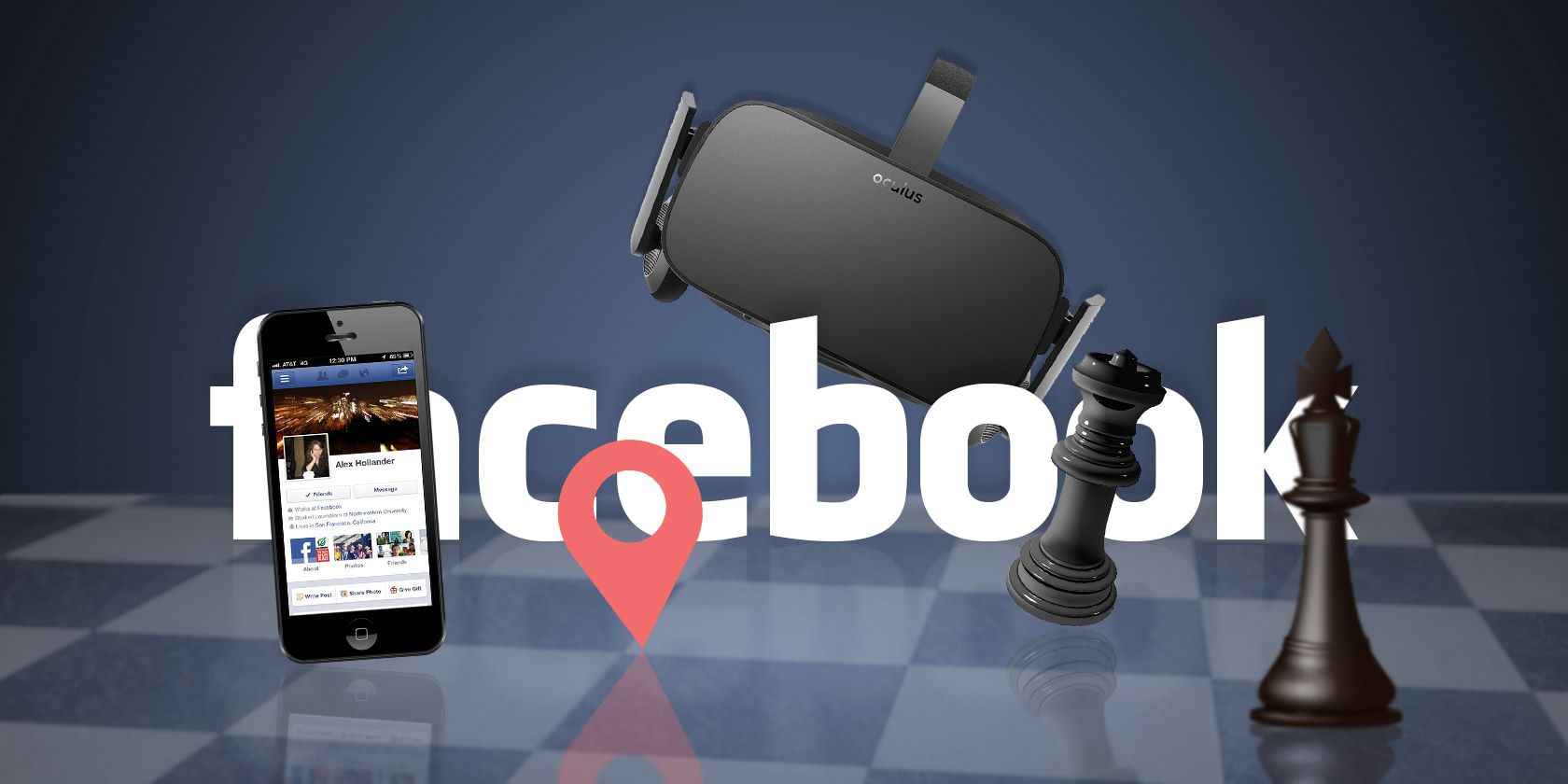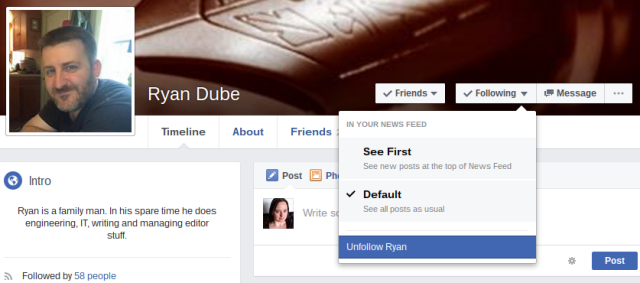You probably use Facebook every day, but you may have missed recent developments. Or maybe you just didn't realize how much of a monolith Facebook has become, and how easily your information might be shared further than you'd like.
Here are some things you really should know about Facebook, in some cases whether you use it yourself or not.
You Can Follow & Unfollow People
Not everyone has cottoned on to the following/unfollowing feature on Facebook, and yet it is arguably the quickest way to clean up your home feed. Let's put it this way: it's similar to Twitter. But there's a little more to it than that.
When you "friend" someone on Facebook, you also "follow" them automatically. But there's no need to continue following them. If some distant acquaintance is clogging up your home feed with stuff you don't really care about, you can "unfollow" them without seeming rude. They'll never know and you'll still be Facebook "Friends" for all other purposes (like finding each other on other social networks, or chatting via Messenger).
On the other hand, if you've found the personal Facebook profile of a celebrity you admire, you can "follow" this person safe in the notion that you're not bothering them to "friend" you back. You'll see all their public posts, and their private posts will stay just for their actual friends.
If you're also receiving a lot of friend requests from people you don't know, you might consider allowing people to "follow" you instead. It's very easy to set up, but you will first want to edit the privacy settings of all your past posts, and remain mindful of your future privacy settings. Don't forget that you are opening up your friends to potential privacy risks if they comment on your public posts, and even more so if you have lots of public followers.
And don't forget if your feed is out of control you can always save items for later and remove all the spammy apps that show up.
You're Probably Giving Away Your Location
Recently, a Facebook intern showed how Facebook's messenger was giving away the locations of all his contacts, and how that could be used to track people in real time. This intern got a slap on the wrist and asked to remove the app, but no doubt other mischievous people will think of coding something similar.
In fact, Facebook have almost coded a similar app themselves. When you use Facebook's Friends Near Me feature, you essentially trade your own location data for the power to see the location of your friends. The feature is popular, because it makes it very easy to see if there is a friend out and about near you when you're having a night out on the town or vacationing somewhere interesting. However, if you leave the feature on while you're vegging and watching Netflix, it could be giving away your home location to all of your acquaintances, not just your best friends. And if you're home alone, that could actually be a serious security risk.
You can only use Facebook's Friends Near Me function on your mobile device. To turn it on or off, head to More > Nearby Friends > Settings Cog Icon and choose whether you want it on or off. Then you can choose which friends you want to share with using Friends Lists. So, do yourself a favor and make sure you keep those Friends Lists up-to-date.
My advice would be to use this feature sparingly when you're out with friends looking for a fun night, and to always remember to turn it off again.
Facebook Keeps Shadow Profiles on Your Friends
Not everyone knows about the dark side of Facebook, but once you do you will never feel quite at ease with it again. It makes perfect sense from Facebook's perspective, but it's a little creepy nonetheless.
What happens is that when people connect their phone books to Facebook, all that information on each contact is stored, along with a connection to the person who synced their phone book. This way, when that person finally joins Facebook, Facebook can suggest friends to them (and the person who synced their phone). But this also means that even if you have no desire to connect with this person, Facebook still knows there's a connection there.
So, that means Facebook knows you have a connection to your kids' school administrator, your doctor, your heart specialist, the help desk of your ISP, your clients, your health insurer, your landlord, your drug dealer, all the parents of your kids' friends, and anyone else you may have emailed or phoned for some reason (if you stored the contact). Facebook knows about all of these people… and that they're connected to you.
Facebook connects this data to all of the other people who have synced their contacts, and can therefore connect you to these third-party connections, no matter how tenuous that may be. They probably even know what many of the people in shadow profiles look like, thanks to all the photos uploaded to Facebook.
Now, consider that law enforcement can ask Facebook for information whenever they like. How do you feel about syncing those contacts now? Scary stuff.
There Are Tons of Cool Things You Can Do with Messenger
Messenger is absolutely exploding with impressive features lately, and it's clear Facebook plan to expand even further on this front. It's now possible to order an Uber car, play Chess or basketball, send money to your friends, and do all sorts of other useful (or not useful) things.
You also don't need to have a Facebook account to use Messenger anymore. The plan seems to be that you should never need to leave chat for any reason, and that you will always be able to communicate with anyone via the Messenger app.
Facebook's Really Investing in Virtual Reality Apps
Facebook recently bought Oculus Rift and has heavily invested in a team to build virtual reality applications for integration with Facebook. The reasoning behind this seems to be that if you're playing a hyper-realistic virtual game with your family, you'll be sociable at the same time. For instance, if you're playing ping pong, it's easy to chat while you play.
Mark Zuckerberg seems to understand that Facebook could easily facilitate the future of sociable interactions just by making it fun to play while you chat. And he's probably right.
You Can Now Video Chat with up to 50 People at Once
It wasn't that long ago that Skype ruled the video-chat world. But now we have countless alternatives, and Facebook's version is absolutely killing it. Some people are still getting used to the fact that Facebook's video chat is even available, and yet Facebook just expanded to allow 50 participants in the video call at the same time.
What this means is that Facebook is now the go-to service for family video chats, small business meetings and more. Given that regular Hangout chats are limited to 10 participants (20 if you use Google Apps), this is a game-changer for meetings and casual chats that were previously hitting those limits.
There are other services that allow more people to easily chat at once, such as Appear.in, but not everyone knows they exist. On the other hand, almost everyone uses Facebook. When you can say "Just open up Facebook, Grandma" and everything works beautifully, you know you're on to something.
You Can Now Live-Stream Video
Also, don't forget that Facebook Live has just been launched for personal profiles, so if you (for some reason) want to chat to more than 50 people at once, you can just go all out and stream yourself live instead. Then your friends will be able to respond in the comments, add emotive responses during your live-streaming and even watch the stream later if they're not around while you're filming.
Facebook Owns Lots of Other Apps
If you've been avoiding Facebook because you're afraid of their incredible power and ulterior motives, you will no doubt want to know about all the other applications Facebook now owns. There are a LOT.
Many companies bought by Facebook were just for the talent, and have since been closed. But you should know about these big names owned by Facebook: WhatsApp, Instagram, Oculus, Ascenta, Onavo, Parse, Moves, and LiveRail.
You Can Decide What Happens After You Die
Most people know that when you die Facebook creates a memorialised page for you. But not everyone knows that it's possible to dictate who can control that page.
Just say you and your siblings are not exactly close. If you don't choose who controls your account, that sibling might submit your death certificate to Facebook and be granted the power to make a few posts on your page. There's every chance that what your sibling chooses to write will be perfectly fine, but if you don't want to risk that, choose your benefactor yourself.
Another consideration worth noting is that the person you choose to control your account will be able to save photos easily and keep their own mementos of you. Don't you want to make things easy for your spouse or your best friend? Choose wisely.
Americans Can Control Which Marketers Get Info
A lot of marketing information is collected by marketers on Facebook, but not everyone knows that some of that can be controlled. If you're an American, there is a directory you can join to limit the marketing information that can be shared about you and the transactions you've made online (and in person).
Joining the directory means that marketers will no longer be able to connect your Facebook profile with the actual purchases you've made. This will limit the hyper-targeted advertising you may have been getting, and the super-scary tracking that may have been going on without your knowledge.
Opt out of Datalogix marketing information collection now.
There may also be similar directories in other countries, so ask around.
And That's Not All
Facebook is such a huge company these days, that this list of things you may not have known is not even scratching the surface. There's plenty more to know, and plenty more will change in the next six months alone.
What is the most surprising thing you know about Facebook? Give us the dirt in the comments so we can all know.


